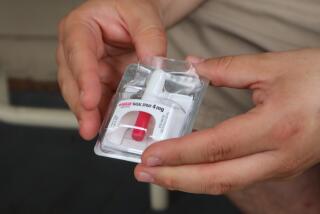California Senate backs plan to enhance prescription monitoring

The California Senate unanimously approved a bill Thursday that would significantly enhance a prescription-monitoring program aimed at curbing drug abuse and overdose deaths.
The bill passed after sponsors made concessions to overcome pharmaceutical industry opposition. It was the last piece of a broad package of proposals approved by the Senate this week that were introduced in response to a series of Los Angeles Times articles linking doctors to patient overdose deaths.
A Times analysis found that 71 physicians prescribed medications to three or more patients who died of drug-related causes. The finding was part of an analysis of 3,733 prescription-drug-related fatalities in Southern California from 2006 through 2011. Nearly half involved at least one drug that had been prescribed to the decedent by a physician.
The bills approved this week included measures that would require coroners to report prescription-involved deaths to the Medical Board of California and that would give the board greater investigative powers.
The prescription-monitoring bill faced the stiffest headwinds even though it had the support of a coalition of law enforcement groups, health insurance companies, and business, labor and consumer organizations, as well as Atty. Gen. Kamala Harris and Senate President Darrell Steinberg (D-Sacramento).
Under the bill, the monitoring program -- known as CURES -- would receive a steady stream of funding from an increase in licensing fees on pharmacists, physicians and other prescribers. The bill also called for a tax on drug makers to allow the attorney general to hire teams of investigators to crack down on drug-seeking patients and doctors who recklessly prescribe to them.
That provision drew opposition from several pharmaceutical and biotech industry trade groups; they succeeded in defeating the bill earlier this week by four votes.
In a last-ditch bid to keep the bill moving forward, its sponsors removed the drug-maker tax -- sacrificing the enforcement squads. After the tax provision was removed, the pharmaceutical companies and trade groups dropped their opposition.
The bills now move onto the Assembly.
Twitter: @lisagirion
More to Read
Sign up for Essential California
The most important California stories and recommendations in your inbox every morning.
You may occasionally receive promotional content from the Los Angeles Times.











